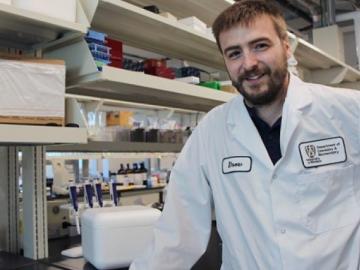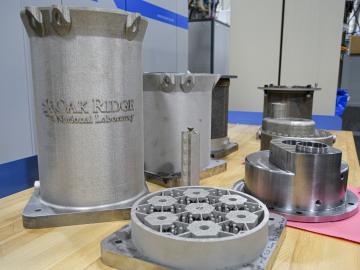
Filter News
Area of Research
- (-) Energy Science (77)
- (-) National Security (26)
- (-) Neutron Science (126)
- Advanced Manufacturing (9)
- Biology and Environment (58)
- Biology and Soft Matter (1)
- Computational Biology (1)
- Computational Engineering (2)
- Computer Science (6)
- Electricity and Smart Grid (1)
- Fuel Cycle Science and Technology (1)
- Functional Materials for Energy (2)
- Fusion and Fission (30)
- Fusion Energy (13)
- Isotope Development and Production (1)
- Isotopes (7)
- Materials (129)
- Materials Characterization (2)
- Materials for Computing (15)
- Materials Under Extremes (1)
- Mathematics (1)
- Nuclear Science and Technology (40)
- Nuclear Systems Modeling, Simulation and Validation (2)
- Quantum information Science (2)
- Supercomputing (75)
News Topics
- (-) Advanced Reactors (7)
- (-) Artificial Intelligence (25)
- (-) Materials (47)
- (-) Microscopy (10)
- (-) Neutron Science (121)
- (-) Nuclear Energy (13)
- 3-D Printing/Advanced Manufacturing (85)
- Big Data (13)
- Bioenergy (33)
- Biology (20)
- Biomedical (21)
- Biotechnology (6)
- Buildings (38)
- Chemical Sciences (17)
- Clean Water (10)
- Composites (18)
- Computer Science (50)
- Coronavirus (24)
- Critical Materials (9)
- Cybersecurity (25)
- Energy Storage (74)
- Environment (64)
- Exascale Computing (2)
- Fossil Energy (3)
- Frontier (3)
- Fusion (3)
- Grid (43)
- High-Performance Computing (12)
- Hydropower (3)
- Isotopes (1)
- Machine Learning (21)
- Materials Science (49)
- Mathematics (3)
- Mercury (3)
- Microelectronics (1)
- Molten Salt (1)
- Nanotechnology (18)
- National Security (37)
- Partnerships (16)
- Physics (11)
- Polymers (12)
- Quantum Computing (1)
- Quantum Science (9)
- Security (16)
- Simulation (4)
- Space Exploration (6)
- Statistics (1)
- Summit (10)
- Transportation (70)
Media Contacts

Matthew R. Ryder, a researcher at the Department of Energy’s Oak Ridge National Laboratory, has been named the 2020 Foresight Fellow in Molecular-Scale Engineering.

Scientists have found a new method to strategically add deuterium to benzene, an aromatic compound commonly found in crude oil. When applied to the active ingredient of drugs to incorporate deuterium, it could dramatically improve the drugs’ efficacy and safety and even introduce new medicines.

Does vaping and smoking e-cigarettes put you at higher risk of COVID-19 complications? UWindsor’s Drew Marquardt is trying to answer that question with research into how the toxicants in the oils of vapes and e-cigarettes affect lung function.

Research by an international team led by Duke University and the Department of Energy’s Oak Ridge National Laboratory scientists could speed the way to safer rechargeable batteries for consumer electronics such as laptops and cellphones.
An international team of scientists found that rules governing plant growth hold true even at the edges of the world in the Arctic tundra.

Researchers at the Department of Energy’s Oak Ridge National Laboratory are refining their design of a 3D-printed nuclear reactor core, scaling up the additive manufacturing process necessary to build it, and developing methods

In the race to identify solutions to the COVID-19 pandemic, researchers at the Department of Energy’s Oak Ridge National Laboratory are joining the fight by applying expertise in computational science, advanced manufacturing, data science and neutron science.

Oak Ridge National Laboratory researchers working on neutron imaging capabilities for nuclear materials have developed a process for seeing the inside of uranium particles – without cutting them open.

A versatile class of flexible, protein-like polymers could significantly advance future drug delivery methods. But first, scientists have to develop a reliable process for tailoring these polymers into shapes that can effectively transport medicines throughout the human body.



